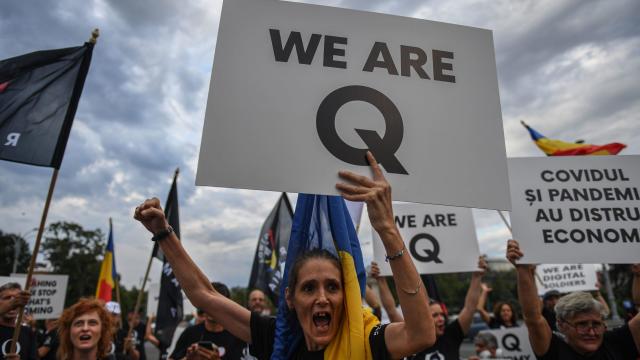The future of the Republican Party faces a mild inconvenience as the world’s largest social network said on Tuesday that it plans to take sweeping action against groups and accounts associated with the QAnon conspiracy across Facebook and Instagram.
The move to ban all QAnon Facebook Groups, Pages, and Instagram accounts regardless of whether they otherwise operate within the company’s rules, which was first reported by NBC News, is a significant escalation over Facebook’s previous policy to only ban QAnon accounts that threatened or celebrate violence. While reducing the availability of QAnon content on its platforms is prudent, it is unlikely to hamstring the rapidly growing movement. And like all good things, banning them all will take time.
“Starting today, we will remove any Facebook Pages, Groups and Instagram accounts representing QAnon, even if they contain no violent content,” the company wrote. “This is an update from the initial policy in August that removed Pages, Groups and Instagram accounts associated with QAnon when they discussed potential violence while imposing a series of restrictions to limit the reach of other Pages, Groups and Instagram accounts associated with the movement.”
Notably, while the new enforcement policy will impact individual Instagram accounts, individual Facebook users will apparently not be similarly targeted. We’ve reached out to the company for clarity on this apparent discrepancy.
QAnon is an ever-devolving amalgam of far-right nonsense that positions Donald Trump is a pseudo-messiah sent to dismantle a global ring of child-raping, Satan-worshiping Hollywood and Democratic elites. Its central figure is an anonymous account known as Q, which posts clues on the hellsite 8kun (formerly 8Chan) that are as nonsensical as they are dangerous.
Growing from a fringe conspiracy theory that likely started as a gag, QAnon has spread beyond image boards and onto every other platform, including Reddit, Facebook, and Instagram. It is now ripping apart families and friends because of how all-consuming it can become for its adherents.
Not surprisingly, QAnon devotees have quickly become one of the most fervent bases of the Republican Party, with several QAnon supporters running as Republican candidates for public office this year. Eighteen sitting members of Congress explicitly voted against a House bill condemning QAnon just last week. A September poll from Daily Kos/Civiqs found that 33 per cent of Republicans believe that the QAnon conspiracy is “mostly true.”
“I’m pleased to see Facebook take action against this harmful and increasingly dangerous conspiracy theory and movement. Just this morning I encouraged the company to take the threat of QAnon more seriously, given increasing evidence that its growth has in large part been propelled by Facebook,” Senator Mark Warner, a Virginia Democrat, wrote in a statement. “Ultimately the real test will be whether Facebook actually takes measures to enforce these new policies — we’ve seen in a myriad of other contexts, including with respect to right-wing militias like the Boogaloos, that Facebook has repeatedly failed to consistently enforce its existing policies.”
It’s unlikely all QAnon accounts and content will disappear quickly or entirely. In September following Facebook’s crackdown on QAnon accounts that celebrated violence, Q wrote in one of the accounts influential drops, “Deploy camouflage. Drop all references re: ‘Q’ ‘Qanon’ etc. to avoid ban/termination,” according to NBC News. Facebook fully acknowledges the challenges ahead for its “Dangerous Organisations Operations team,” which is tasked with weeding out QAnon accounts.
“We expect renewed attempts to evade our detection, both in behaviour and content shared on our platform,” the company wrote. “We will continue to study the impact of our efforts and be ready to update our policy and enforcement as necessary.”
